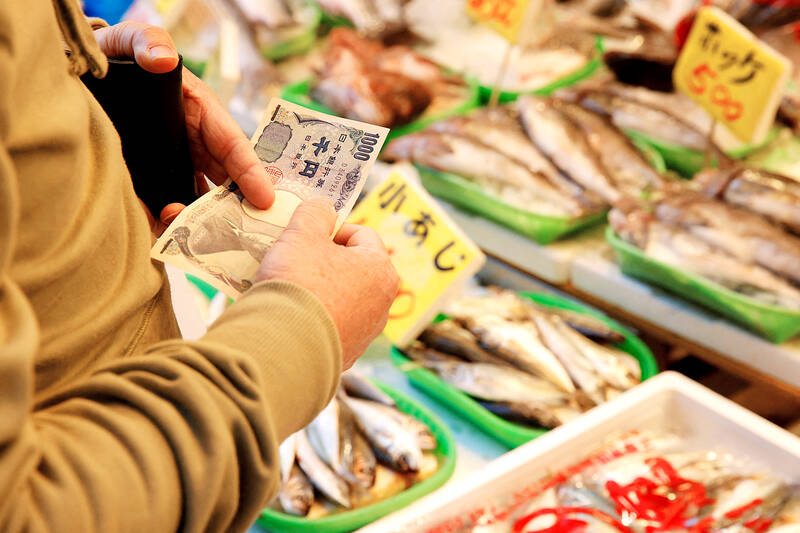Japan’s inflation re-accelerated last month after cooling earlier in the year, likely supporting views that the central bank might have to revise its price outlook, bringing the Bank of Japan (BOJ) a step closer to policy normalization.
Consumer prices excluding fresh food rose 3.4 percent from a year ago, quickening from the previous month, driven by gains in processed food and hotel prices, the Japanese Ministry of Internal Affairs and Communications reported yesterday.
The result came in line with analysts’ forecasts.

Photo: Reuters
The national data were consistent with the results of the leading Tokyo figures, which showed renewed upward momentum after two months of deceleration.
The acceleration in the key inflation gauge is likely to cement the view of many BOJ watchers that the central bank would bump up its price forecasts, leading to speculation over policy adjustment as early as July.
“These are very strong figures,” Dai-Ichi Life Research Institute senior executive economist Yoshiki Shinke said.
Underlying inflation “continues to accelerate, reflecting businesses passing their costs onto consumers. There is no doubt that the BOJ will raise its inflation outlook for this fiscal year in July,” he said.
In the latest quarterly outlook report, the BOJ projected core prices rising at just 1.6 percent in fiscal 2025, implying that the bank’s 2 percent sustainable inflation goal would not be achieved within its forecast period.
At the same time, new BOJ Governor Kazuo Ueda has indicated that once the inflation target comes into sight, he would adjust existing policy, including the yield curve control program.
Processed foods continued to drive overall inflation, boosting it by 2 percentage points. Food prices rose 9 percent compared with the previous year, the biggest jump since 1976. Service costs increased 1.7 percent, the biggest gain since 1995 excluding the impact of sales tax hikes.
Prices excluding the impact from energy and fresh food, a measure of the deeper inflation trend, also quickened to the fastest pace since 1981.
Food price hikes also do not seem to be ending anytime soon. The prices of about 5,600 food items are expected to rise from next month, a Teikoku Databank report said.
“Food price increases will continue at least until this fall,” the data firm said.

Intel Corp chief executive officer Lip-Bu Tan (陳立武) is expected to meet with Taiwanese suppliers next month in conjunction with the opening of the Computex Taipei trade show, supply chain sources said on Monday. The visit, the first for Tan to Taiwan since assuming his new post last month, would be aimed at enhancing Intel’s ties with suppliers in Taiwan as he attempts to help turn around the struggling US chipmaker, the sources said. Tan is to hold a banquet to celebrate Intel’s 40-year presence in Taiwan before Computex opens on May 20 and invite dozens of Taiwanese suppliers to exchange views

Application-specific integrated circuit designer Faraday Technology Corp (智原) yesterday said that although revenue this quarter would decline 30 percent from last quarter, it retained its full-year forecast of revenue growth of 100 percent. The company attributed the quarterly drop to a slowdown in customers’ production of chips using Faraday’s advanced packaging technology. The company is still confident about its revenue growth this year, given its strong “design-win” — or the projects it won to help customers design their chips, Faraday president Steve Wang (王國雍) told an online earnings conference. “The design-win this year is better than we expected. We believe we will win

Chizuko Kimura has become the first female sushi chef in the world to win a Michelin star, fulfilling a promise she made to her dying husband to continue his legacy. The 54-year-old Japanese chef regained the Michelin star her late husband, Shunei Kimura, won three years ago for their Sushi Shunei restaurant in Paris. For Shunei Kimura, the star was a dream come true. However, the joy was short-lived. He died from cancer just three months later in June 2022. He was 65. The following year, the restaurant in the heart of Montmartre lost its star rating. Chizuko Kimura insisted that the new star is still down

While China’s leaders use their economic and political might to fight US President Donald Trump’s trade war “to the end,” its army of social media soldiers are embarking on a more humorous campaign online. Trump’s tariff blitz has seen Washington and Beijing impose eye-watering duties on imports from the other, fanning a standoff between the economic superpowers that has sparked global recession fears and sent markets into a tailspin. Trump says his policy is a response to years of being “ripped off” by other countries and aims to bring manufacturing to the US, forcing companies to employ US workers. However, China’s online warriors